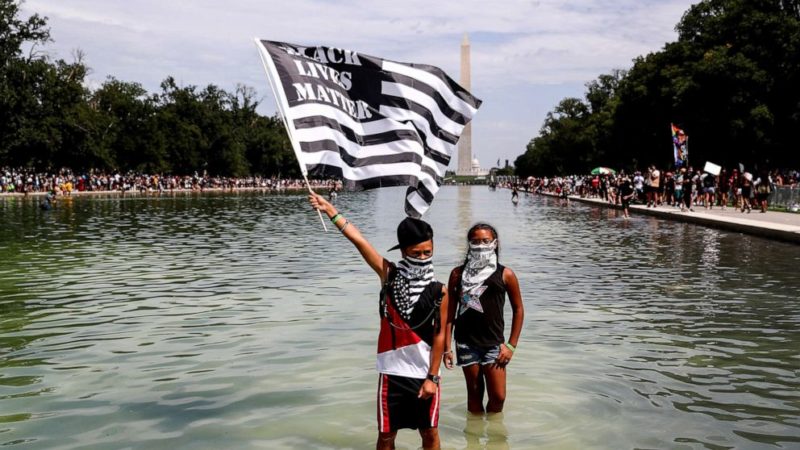From the first March on Washington to today, images of Black suffering reveal America’s painful truths
Share
Explore Our Galleries
Breaking News!
Today's news and culture by Black and other reporters in the Black and mainstream media.
Ways to Support ABHM?
New documentary, ‘The March on Washington: Keepers of the Dream’ traces the connections over six decades of protest
By Jesse Washington
She is wearing a belted dress and carefully done hair, falling backward to the sidewalk beneath the hands of three white police officers. It is 1963 in Birmingham, Alabama. Then we see her lying on her back, pocketbook askew, trapped in a position that connects past and present in one sickening instant:
A cop is pressing his knee down onto the Black woman’s neck.
This is one of the most arresting sequences of the new documentary The March on Washington: Keepers of the Dream, which premieres Thursday at 10 p.m. ET on the National Geographic Channel and begins streaming Friday on Hulu. Produced in collaboration with The Undefeated, the film explores how violence against Black people, inflicted by police and white vigilantes, fueled both the original civil rights movement and its current revival….

Photo by Tom Brenner, A demonstrator holds a Black Lives Matter flag as he wades into the waters of the Lincoln Memorial reflecting pool as protesters gather for the “Get Your Knee Off Our Necks” March on Washington in support of racial justice in Washington, D.C., Aug. 28, 2020.
…Decades ago, the Ku Klux Klan seized extralegal authority to keep Black people in what they thought was their place. “It’s much like today,” Berry said in the film, “we talk about the ‘Karens’ who feel called upon when they see some Black person doing some routine thing that they think is out of the way or they shouldn’t be doing it, [and] take it upon themselves to impose a kind of order.”
The film covers the years between 1963 and 2020 by way of the war on drugs and mass incarceration. Starting with President Richard Nixon’s policies in the 1970s, then championed by presidents Ronald Reagan and Bill Clinton, these political strategies created an image of Black men as out-of-control criminals who deserved to be handcuffed, beaten, shot or killed. Is it any wonder, then, what happens to a Rodney King, or an Eric Garner, or a Breonna Taylor?…
Read the full article here.
Learn about details of injustice against African Americans by reading about the War on Blacks and the powerful influence of the Black Press.
More Breaking News here.









Comments Are Welcome
Note: We moderate submissions in order to create a space for meaningful dialogue, a space where museum visitors – adults and youth –– can exchange informed, thoughtful, and relevant comments that add value to our exhibits.
Racial slurs, personal attacks, obscenity, profanity, and SHOUTING do not meet the above standard. Such comments are posted in the exhibit Hateful Speech. Commercial promotions, impersonations, and incoherent comments likewise fail to meet our goals, so will not be posted. Submissions longer than 120 words will be shortened.
See our full Comments Policy here.